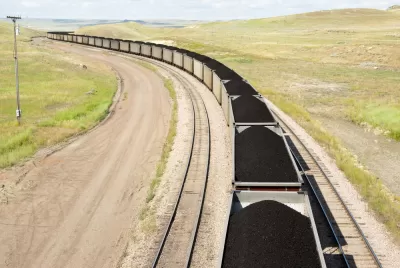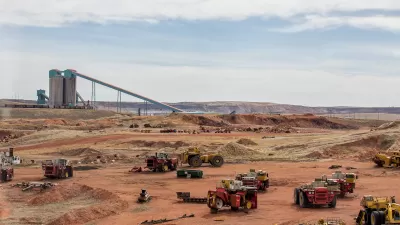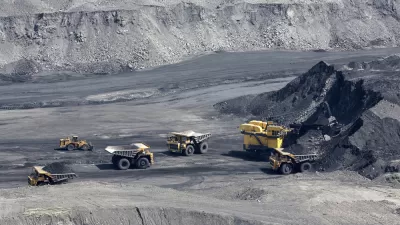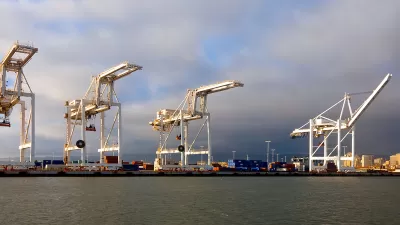A legal battle is being waged between the coal-exporting states of Utah, Wyoming, and Montana and coastal cities in California, Oregon, and Washington that pits the power of local land-use authority against the protection of interstate commerce.

Coastal cities in the three West Coast states have taken a stand to fight global climate change and protect local public health by barring the export of coal, the dirtiest of fossil fuels, which is being resisted in the courts by Mountain States where coal mining is central to their economy.
Anna M. Phillips reports on Feb. 26 for the Los Angeles Times on the legal conflicts between the Western mining states and the West Coast port cities.
If all had gone according to the coal industry’s plan, as many as seven ports in California, Oregon and Washington might have become gateways to energy-hungry Japan, China and India — and a lifeline for coal producers in landlocked Western states.
However, many West Coast state and city leaders have resisted their plan. Five were canceled due in part to market uncertainty and "two have been challenged in courts in California and Washington," according to Reuters on Jan. 21.
"Lawmakers in Oakland and Washington state blocked plans for coal-export terminals, citing health concerns and pollution risks," adds Phillips. And on January 14, another Bay Area city sent shock waves to Utah's coal mining industry.
Just last month the Richmond City Council gave the California city’s port three years to phase out coal exports. Nearly all coal mined in Utah is exported to Japan through Richmond, an arrangement that would end under the new ordinance [pdf].
Coal companies and coal-state lawmakers quickly condemned the decisions as ideologically motivated and discriminatory, and acted.
Utah lawmakers, who previously agreed to spend $53 million to guarantee coal exports out of Oakland, are now weighing whether to set aside $500,000 to sue Richmond over its ban on coal handling and storage.
Local land-use authority vs. interstate commerce
The port cities justify their actions on the public health impacts of coal, joined by environmental groups that want to reduce the burning of fossil fuels to fight climate change. The coal industry and the port facility at the center of the Richmond controversy view it differently.
“We believe that these coastal states are using their local authorities for land-use planning to essentially block interstate commerce,” said Utah Mining Assn. President Brian Somers. “If California produce or other commodities come through on a train, we don’t have the authority to stop them at the border. That’s what’s happening to our coal.”
Christopher Locke, an attorney for Levin-Richmond Terminal Corp. (LRTC) told the Richmond City Council on Jan. 14 "that the ordinance would violate ‘taking’ protections under the California Constitution and the United States Constitution, the Commerce Clause of the United States Constitution, the Due Process and Equal Protection Clauses of the United States and California Constitutions," reported Chris Dupin for Freighwaves.
Attorneys for the Sierra Club, however, said the ordinance was “an entirely lawful exercise of the police power that does not run afoul of constitutional or statutory requirements,” and Christiana Tiedemann, the former chief counsel for the California Environmental Protection Agency, wrote to the council saying that a threat of litigation because the city was unlawfully terminating the existing coal storage and handling land use in Richmond “has no merit.”
On March 5, Levin Enterprises, which operates the terminal and an affiliated shortline railroad, filed suit, according to Law360, a paid subscription service. Also filing suit was Wolverine Fuels LLC, which ships coal from Utah to the Levin facility. Both cases will be heard in Federal District Court – Northern District of California.
"Should the states lose their lawsuits, it could embolden left-leaning coastal states to use permitting decisions and zoning laws to fight global warming by preventing the export of fossil fuels," adds Phillips in the source article. "Alternatively, if the coal states win, they and other energy-producing states could try to force the West Coast to accept not only coal but also liquefied natural gas."
Additional reading:
- "Big setback for Utah mines as Bay Area port city bans coal," The Salt Lake Tribune, January 16, 2020
Related in Planetizen:
-
Federal Judge Strikes Down Oakland's Ban on Coal Exports, May 18, 2018
Hat tip to Ara Marderosian.
FULL STORY: Coal states sue California cities and Washington state to force ports to ship exports

Study: Maui’s Plan to Convert Vacation Rentals to Long-Term Housing Could Cause Nearly $1 Billion Economic Loss
The plan would reduce visitor accommodation by 25,% resulting in 1,900 jobs lost.

North Texas Transit Leaders Tout Benefits of TOD for Growing Region
At a summit focused on transit-oriented development, policymakers discussed how North Texas’ expanded light rail system can serve as a tool for economic growth.

Using Old Oil and Gas Wells for Green Energy Storage
Penn State researchers have found that repurposing abandoned oil and gas wells for geothermal-assisted compressed-air energy storage can boost efficiency, reduce environmental risks, and support clean energy and job transitions.

Opinion: DC Encampment Sweeps Hide, but Don’t Solve, Homelessness
President Trump recently ordered the clearing of encampments built by unhoused people on federal land in Washington, D.C.

Santa Barbara Could Build Housing on County Land
County supervisors moved forward a proposal to build workforce housing on two county-owned parcels.

San Mateo Formally Opposes Freeway Project
The city council will send a letter to Caltrans urging the agency to reconsider a plan to expand the 101 through the city of San Mateo.
Urban Design for Planners 1: Software Tools
This six-course series explores essential urban design concepts using open source software and equips planners with the tools they need to participate fully in the urban design process.
Planning for Universal Design
Learn the tools for implementing Universal Design in planning regulations.
Ascent Environmental
Borough of Carlisle
Institute for Housing and Urban Development Studies (IHS)
City of Grandview
Harvard GSD Executive Education
Toledo-Lucas County Plan Commissions
Salt Lake City
NYU Wagner Graduate School of Public Service





























